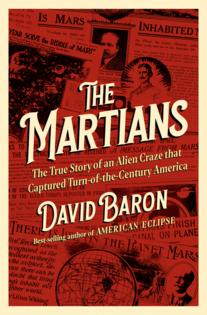Review: Book shows why we, like our ancestors, have a thing for Mars
Published in Books News
Mars, our reddish-hued neighbor in the solar system, oh how you have captivated us earthlings, fueling an obsession at the turn of the last century that David Baron documents in his oh-my-goodness-they believed-what? romp “The Martians.”
Hindsight is 20/20, as they say, and never more so than in recounting the endeavors of yesteryear’s gentleman scientists. In the case of “The Martians,” Percival Lowell fills that role, he of the Massachusetts Lowells, whose boundless wealth was amassed through textiles.
Despite expectations that he would follow in the tycoon footsteps of his predecessors, Percival wasn’t businessman material. “Not that I quite go in for murder as a necessary stimulus, but people might learn to be lively and gay without being bad,” he complained to his sister about working in his grandfather’s boring office.
Instead, Lowell was a young man in search of deeper meaning at a destabilizing, but heady, time. The Industrial Revolution was still raging, and invention after invention — the steam engine, the incandescent light, the telegraph — would change everything, as would a philosophical framework called evolution, “providing a new way of seeing the universe and its workings.”
Before his gaze would turn to the heavens, however, Lowell found his initial destiny in Japan and Korea as a sort of cultural liaison. He spent many years abroad until the “Mars boom of 1892” caught his fancy.
Discoveries stoked the Mars craze: Astronomers had noticed “the sudden appearance of three bright spots, like powerful searchlights shining from high peaks set far apart” and the emergence of canals “etched” on the face of the planet. But the rise of the yellow press — such as Joseph Pulitzer’s New York World, which employed widely imitated, sensationalist tactics to grab the public’s attention — kept the red planet at the forefront.
Lowell jumped on the bandwagon and hurriedly so, bankrolling and putting himself in charge of an expedition to Arizona territory to set up a telescope ahead of Mars nearing the Earth in 1894. Lowell’s stated goal was to ascertain whether life existed on the planet because surely the canals were “the result of the work of some sort of intelligent beings.”
Even though today’s reader knows the answer to whether life exists on Mars or whether the red planet can sustain life, Baron skillfully builds tension around the house of cards Lowell creates. How and when everything will come tumbling down is a powerful narrative driver, as is placing it all in historical context: Nikola Tesla enters the picture as do Guglielmo Marconi, H.G. Wells and other recognizable names.
Baron meticulously pieces all of this together, including, where applicable, his research forays. When he discovers an “as-yet hidden tranche of the Lowell family’s papers — unprocessed ones, never before seen by scholars” you can practically hear him triumphantly yelling, “Score!”
It’s this and his obvious affection for the foibles of our forebears that are contagious, making “The Martians” less a “cautionary tale of mass delusion,” than a love story, “an account of when we, the people of Earth, fell hard for another planet.” Prepare to be dazzled by the romance, too.
____
The Martians
By: David Baron.
Publisher: Liveright, 336 pages.
©2025 The Minnesota Star Tribune. Visit at startribune.com. Distributed by Tribune Content Agency, LLC.













Comments